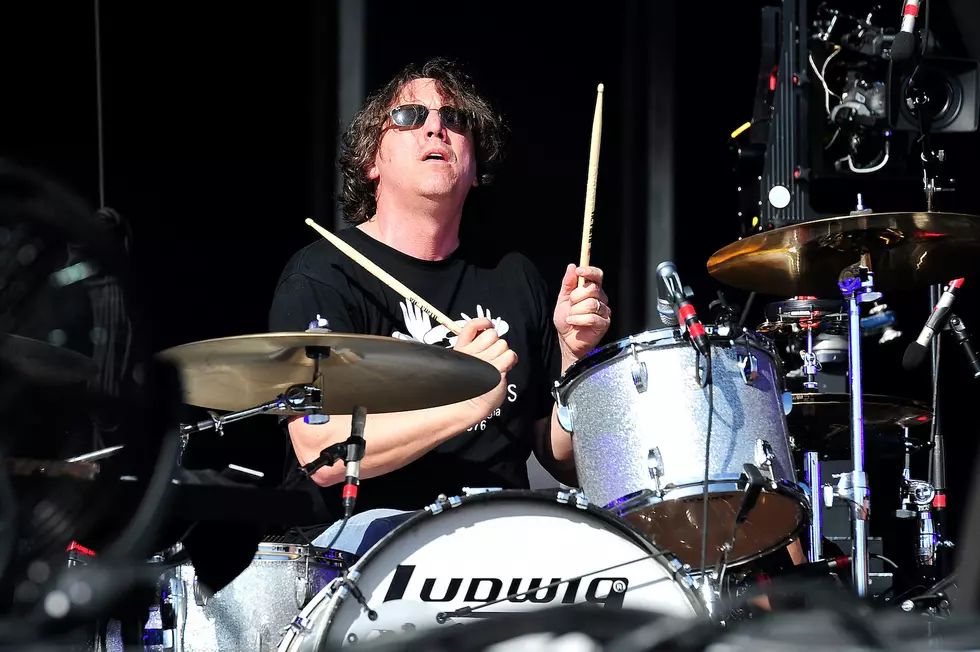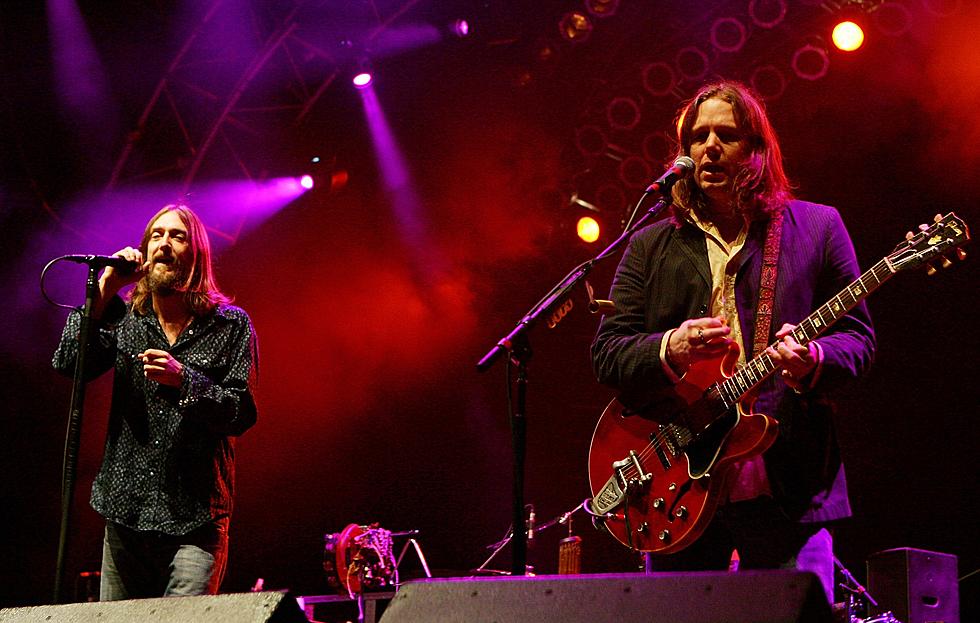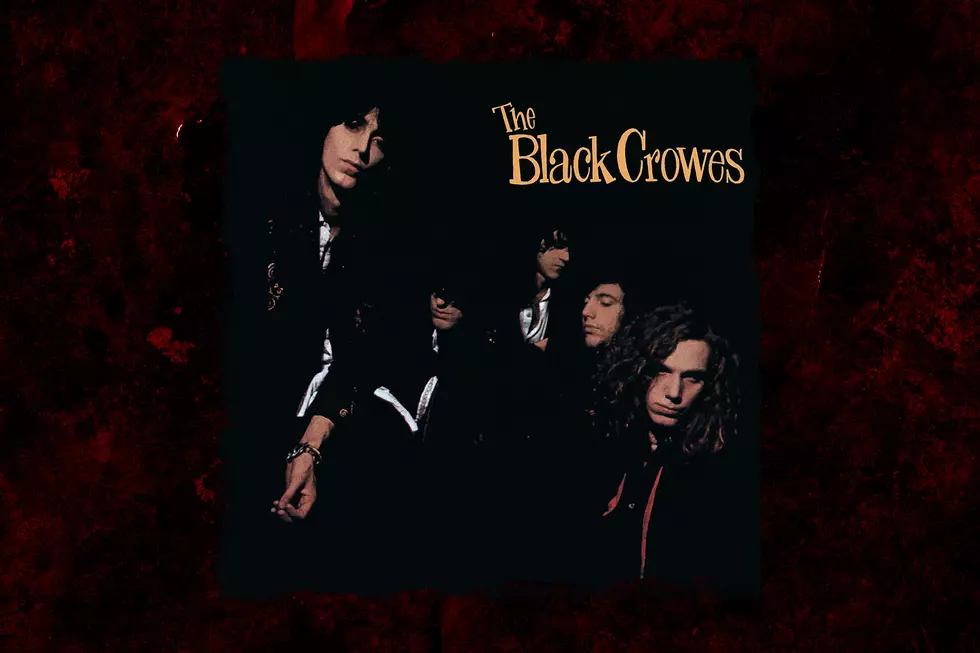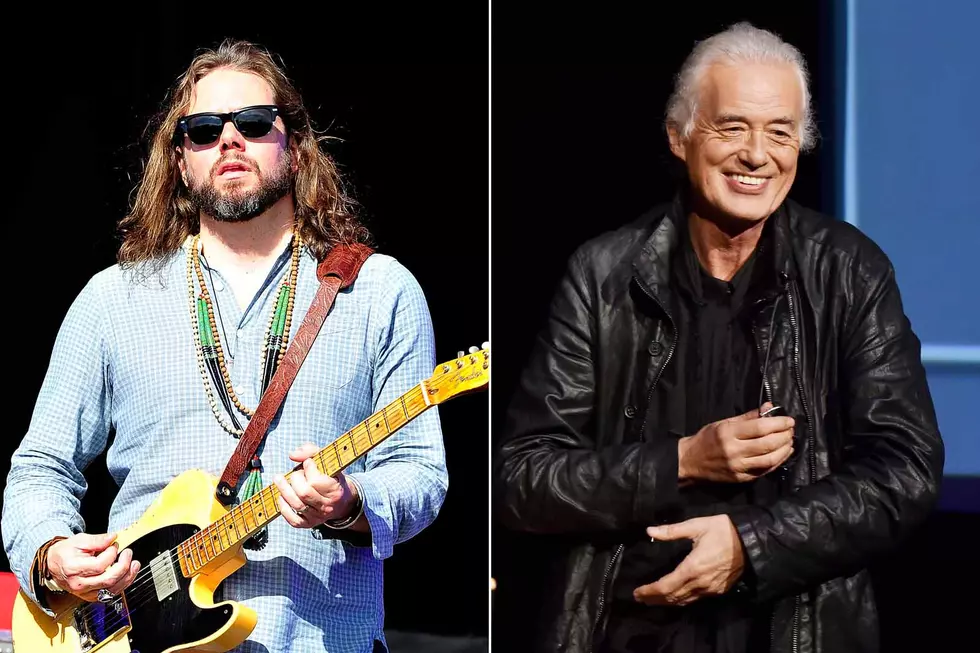
Drummer Steve Gorman Won’t Be Part of Black Crowes Reunion
As the 30th anniversary of the Black Crowes' 1990 debut album, Shake Your Money Maker, approaches, rumors are swelling that they'll be celebrating with a reunion next year. It will mark the first time brothers Chris and Rich Robinson have played together since the band broke up in 2014.
Rich confirmed in a 2015 statement that the group had called it quits. "I love my brother and respect his talent," Robinson said at that time. "But his present demand that I must give up my equal share of the band and that our drummer for 28 years and original partner, Steve Gorman, relinquish 100 percent of his share, reducing him to a salaried employee, is not something I could agree to."
They've all remained active over the past five years, with Chris churning out a series of releases with the Chris Robinson Brotherhood and nonstop tours, and Rich focused on solo work. He also formed a new band, the Magpie Salute, featuring a number of former Crowes members who perform a mix of original material and favorites from their old band's catalog. Eventually, Chris also dipped back into his Black Crowes past, putting together a group called As the Crow Flies for a short run of dates in 2018.
Gorman has kept busy too, with a successful sports radio show, Steve Gorman Sports!, which ran daily from the beginning of 2014 through September last year on Fox Sports Radio. His other band, Trigger Hippy, which first sprang to life a decade ago, is back with a newly recharged lineup. They're now celebrating the recent release of Full Circle and Then Somejust as Gorman returns to radio with a new nationally syndicated night show, Steve Gorman Rocks!, which shifts the focus to music.
And then there’s his new book, Hard to Handle: The Life and Death of the Black Crowes, which charts the highs and lows of his nearly three-decade history with the Atlanta-bred band. “The number of shows is in the dozens where, as we’re going to the stage, they’re throwing punches at each other,” Gorman said of the Robinson brothers, in a recent Wall Street Journal story exploring the details of the rumored reunion. “And then, 20 seconds later, we’re crushing ‘Sting Me’ onstage.”
Gorman’s Hard to Handle memoir, written with collaborator Steven Hyden, details a number of similar incidents that help to explain why he’s not waiting by the phone for a call to join the reunion -- not that he even expects to receive an invitation. But it also helps to illustrate what made the Black Crowes such a force in the '90s. In the first part of UCR's conversation with Gorman, he talks about the new Trigger Hippy album and what fans can expect in the coming year. He also digs into the rumored Black Crowes reunion and why he won’t be part of it if it actually happens.
It’s cool to see all of the positive reaction flying around to the new Trigger Hippy album. At the time, it seemed like the first record was a bit under the radar, so I wasn’t sure what sort of reaction and reception to expect for this one. Which I guess you can say is the feeling that bands generally have about every new record they put out into the world.
Oh God, yeah. Not a clue. This record, it was a really slow process, but it’s a weird thing: The older I’ve gotten, the more patient I’ve gotten, which is really kind of a counter-intuitive feeling. But I’m aware of the fact that there’s only so many grains of sand left in the hourglass, if you will. But it was going well and we didn’t want to speed it up, because it just seemed like it was falling into place. Every time we’d get together and work, we came up with something we really liked. The stuff that ended up on the record, more than we thought, “These are the 12 best songs," we thought these are the 12 songs that roll together the best. We have a lot of music and a ton of material and this is very forward looking as a band now, which has always been the goal. It’s like, Let’s get to a place where we’re just ready to just lay it down and keep going. Hopefully, that’s where we are now. That’s certainly how we see it right now.
It sounds like you guys are going to get out and get a chance to do some significant touring.
Yeah, for sure. We’ve got the first couple of weeks in November, and then in December there are a few weeks here and there. We’re looking at some stuff in the early part of the year, but by spring and summer next year we’re definitely going to be busy.
Listen to Trigger Hippy's 'Full Circle and Then Some'
Before we dig into discussing your book, there's a lot of talk about a Black Crowes reunion going around right now. As you know, since you’re quoted in it, even the Wall Street Journal has done a story. Looking at some of the rumor mill-type of stuff that's out there, first there's the word that you were approached to be a part of the reunion. Has that happened in any form?
No.
Really?
Oh no. And it won’t happen. Trust me. [Laughs] This reunion, I’ve heard from many sources for several months that this is happening. This ain’t got nothin’ to do with trying to re-find a musical connection. This is a very different motivation and impetus, so the last thing that the brothers Robinson are going to do is involve someone who is going to take a chunk of the pie away from them.
That makes total sense, particularly for folks who've read your book. But I think that for fans, it’s early enough that they would be surprised for you not to be approached at all. It also seems like on the one side from a business standpoint, Live Nation or whoever is putting this tour together, would push to have as many of the longtime core members involved as possible.
Yeah, well, again, you see, that makes perfect sense. So that right there is a problem. If the Black Crowes had ever operated in a way that made perfect sense, the lineup from ‘92 to ‘97 would have never gone away. You know what I mean?
For sure.
There was never an understanding of the true strength and power of the band. And the Robinson brothers are showing that very clearly. They have every right to do this. When I quit the band in 2001, I relinquished my right to the name. I never thought I’d be back to begin with. And I never was cut back in on that side of things as far as a third of the partnership in terms of who owns the name the Black Crowes. And that’s fine. The truth is, when Chris blew the band up in 2014, the last thing I wanted was to be involved in a continuing string of emails from lawyers and accountants trying to get everybody to agree on something. It’s been much nicer to know that this is all in the rear view. And again, they wouldn’t ever think of approaching me, but it’s going to be a pretty tough thing to make sense of, six years after Chris said, “I need all of the money or I’m never doing this again” and then suddenly saying, “Okay, I’m ready to do it again.” I mean, it just speaks for what’s going on. They painted themselves into a corner and they need to go out as the Black Crowes, and I don’t think, frankly, they give two flying fucks who is in the band onstage with them.
They’re going to go do what they have to do. And I don’t begrudge anybody who can make a living playing music in their 50s on principle. It’s like, Good for you. But the way this will be spun, and the way that everything has been spun for years, [it is] a pretty dubious suggestion that this is anything about a reunion or an anniversary.
You detail in your book how, when they went on the road without you in 2005, things didn’t go well. Eventually Pete Angelus, the band's manager at that time, is on the phone with you, working things out to get you back with the band. Now, is there in your mind any deal that could be struck that would get you to climb back behind the kit with the band?
Not that I can imagine, and I have a really active imagination. So I would say no. And the truth is this, I have absolutely no interest in being in a room with either one of those guys, much less onstage with them for a year and a half. I have worked my ass off to make sure that I was never in a position where I thought I might have to do this. So, I mean, there’s that. I don’t need it. The reality is, if they did call me and if they did call Johnny [Colt] and if they did call Marc Ford or if they called Sven [Pipien], what are the chances that band is ever as good as it once was? I would say nil. So there’s pragmatic considerations, and I don’t need that. And then on top of it, once you really do get down to the music of it, if this were about music, those phone calls would have been made. It’s not about music. It is what it is. I mean, if I wanted to go see some soccer games in Europe and the tour made sense for me, okay, maybe. [Laughs] You know what I mean? I’d be looking at it for things like that. Do I want to go play a bunch of festivals next summer? Well, no, not really. I’m not missing that on any level. And again, musically speaking, this Trigger Hippy album, I’m not one to say that this is the best thing ever, but I am as proud of this record and I love this record as much as anything I’ve ever done. So my musical jones is more than sated with Trigger Hippy.
You write in the book about how there was a point where you couldn’t afford to walk away. Then you got to the point where when you were able to walk away, you were able to do that. But you did a lot of work to get to that point, so I can understand why you'd be hesitant to return to the scene of the crime.
I don’t say any of that stuff flippantly, because it’s not a flippant thing when you talk about a 27-year period of your life. But in 2005, I did go back solely because I wanted to rewrite the ending. I mean, there was no talk of a record in 2005. It was, “We’re just going to go play shows. We’re going to play shows and see if we can be great again.” Now, I was all for that. And then that bled into 2006 [where] that was still the thinking. Then as things started to unravel in 2006, I can look back now with clarity, but at the time, it was like, “Oh fuck, man, this was about to be great again, now it’s not. Let’s see what we’re going to do.” I was actively looking around, as were the brothers. I mean, the thing that a lot of people have asked me about the book, they were like, “Wait, you were just trying to figure out when to leave for years?” And I’m like, “Well, yeah, as was Chris, obviously.” It’s not a thing about me as much as just my reaction to the situation. I was stuck and when I talked about finally being ready to be in a place to leave, believe me, that went way beyond financially secure, that was all about emotionally and philosophically, am I really doing the right thing for me? And I did have second questions later, but none of those things are happening now. Because to me, the band died, legitimately, the second I got an email from Chris demanding all of the money. It’s like, You want to talk about closing a coffin? Done.
I don’t know the mea culpa that would have to come on the heels of that six years later, but first of all, it sure as shit hasn’t happened, and secondly, I can’t imagine it ever would. And then also, the thing that really shifted me from "I’m going to write a book one of these days" to actually "I’m going to write a book" was when Ed Harsch died. It wasn’t that day, it wasn’t that week. But within three or four months, all of a sudden, I would be sitting at my laptop and I would just start jotting down thoughts and frameworks and bullet points. I was just doing it and one day [and] I literally said out loud, “Oh my God, I think I’m going to write a book now.” My wife looked over and went, “What?” I said, “I’m going to write this fucking book, I think.” I can tell [you] right now that I never wanted to write an angry or bitter book about the Black Crowes. Ed’s death removed all of that. It was a level of finality that I didn’t know I needed to get to. But once Ed died, I just felt, oddly, really appreciative and grateful for all of the positives that came from the band and it just put everything into a really sharp relief. I got such clarity. And then I realized, “Oh my God, okay, I was really pissed off about how this thing ended.” I’m not angry anymore. I can’t imagine it ending in any other way. The band was such a contentious existence on a day-to-day basis and that was all gone. I just thought, “Fuck, man. Ed died. I’m really not going to feel good about going to my grave without telling my story." I think it’s a great story. I have enough distance from it to go, “Hell, if this was someone else’s [story], that’s a fuckin’ wild ride right there.”
See the Black Crowes and Other Rockers in the Top 100 Albums of the '90s
More From 94.9 WMMQ










